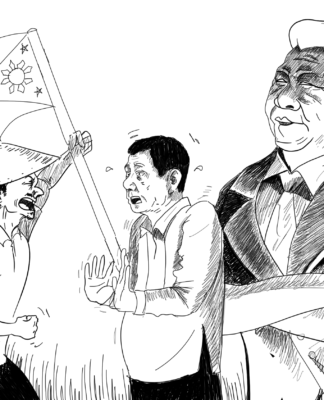MORE THAN a year after being declared as Centers of Excellence (COE) and Centers of Development (COD), several programs of the University have not yet received the millions worth of assistance funds from the Commission on Higher Education (CHEd).
The delay in the release of the funds was due to the pending submission of liquidation reports and receipts of previous CHEd-funded projects by the University’s Office of the Internal Auditor to CHEd, said Journalism coordinator Jeremaiah Opiniano.
“The problem is that CHEd had ordered all higher educational institutions to settle all previous CHEd-funded project funds first, including those from the late 1990s. Unless all those are settled, the faculties in the university will not get their new funding as COE or COD,” Opiniano said in an e-mail interview. “We are dependent on UST's auditing of the remaining CHEd-funded programs which will then be forwarded to CHEd.”
UST’s COEs like Philosophy and Music programs and CODs like Literature, Journalism and Psychology are entitled to receive financial assistance from CHEd amounting to one to two million pesos for scholarships, faculty development, library and laboratory upgrading, research and extension services, instructional materials development, and networking.
However, Tess Samonte, staff of CHEd Commissioner Alex Brillantes Jr., said CHEd has already approved the two-million fund of Music, and other programs such as Philosophy, Literature, Journalism and Psychology are still being reviewed by the technical committee.
“The fund for the Conservatory of Music has already been approved en banc so we are just preparing the voucher. But the other programs are still under review by the technical committee,” Samonte said in a phone interview.
Opiniano said the UST Journalism program will use their one-million fund for a one-year project titled "Project Excellence on Instruction, Research and Extension to Improve Global Journalism by Filipinos," which will help smaller journalism schools in Manila such as the University of the East, Colegio de San Juan de Letran and Lyceum of the Philippines University.
“The fund will be used to establish an online news organization with reporters coming from the four journalism schools (including UST) and with pro bono editors who are professors in journalism,” he said.
According to Opiniano, the project will open a Media Practice and Research Unit to be used by students and faculty, and will also fund the publication of researches related to media studies conducted by the Journalism professors.
Philosophy Department Chair Paolo Bolaños echoed that their assistance fund from CHEd is not yet given, but the department has its own institutional fund that is used for projects like research and faculty development.
“While we already have active and continuous projects supported by UST, the funding from CHEd will allow us to expand the scope of these projects,” Bolaños said in an email. “For instance, if UST, for some reason, is not able to provide travel grants to its researchers who participate in international conferences, a COE stimulus grant could be a possible alternative source.”
Meanwhile, Music Dean Raul Sunico said the Conservatory has already submitted all the requirements demanded by CHEd but their two-million fund, which is intended to purchase musical instruments and organize stage performances, is still not given.
“We are not confident if we will get the funding because we are waiting for it for the longest time,” Sunico said in an interview.
CHEd, which oversees the country's public and private colleges and universities, deemed these centers as having “demonstrated the highest degree or level of standard along the areas of instruction, research and extension” based on instructional quality, research and publication, outreach program, and institutional linkages and qualifications.
Higher education institutions (HEI) can apply COE or COD when CHEd declares “the application for such status open.” HEIs may be invited by the Technical Panel “or may apply on the school’s initiative.
The criteria for COE and COD are Instructional Quality (45 percent), Research Publications (30 percent), Extension and Linkages (20 percent), and Institutional Qualifications (five percent).
Last April, CHEd has extended the recognition of COEs and CODs for another year, giving them more time to implement their projects.
Other University programs with COE status are Biology, Chemistry, Medicine, Nursing and Teacher Education while CODs include Physical Therapy, Chemical Engineering, Civil Engineering, Electrical Engineering, Electronics Engineering, Industrial Engineering and Mechanical Engineering. Jerome P. Villanueva
















